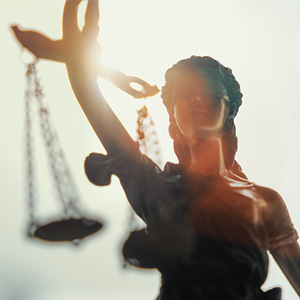Reception Reunites Youth Law Fair Founders to Celebrate Program’s 25th Anniversary
March 19, 2024
From left to right: Matthew Watson, Karen Hardwick, Angela Thornton, Judge Melvin Wright, and Myles Lynk
The D.C. Bar hosted an evening reception at its headquarters on March 15 that brought together many of the figures involved in launching the Youth Law Fair 25 years ago.
A collaboration with D.C. Superior Court, the annual Youth Law Fair provides local middle and high school students a realistic perspective on court proceedings by participating in mock trials as judges, jurors, prosecutors, defense attorneys, and witnesses under the guidance of D.C. judges and D.C. Bar members.
Addressing attendees at the reception, Superior Court Chief Judge Anita Josey-Herring referenced D.C. Bar President Charles Lowery’s recent column in Washington Lawyer, titled “We Can’t Hit Pause on Diversity.” Josey-Herring said it was an important statement in support of continuing efforts to advance diversity, equity, and inclusion during a time when DEI programs are facing increasingly vocal opposition. She drew connections between Lowery’s column and her recent experience addressing participants of Georgetown University Law Center’s RISE program, which supports first-generation law students.
“Society is not equal, and life is not fair,” said Josey-Herring, quoting her remarks at Georgetown. “Some people have more advantages than other people who have exposure or support, and it is important for institutions to give extra support to people who do not have advantages.”
“The beauty is that these young people have that support and are thriving. That’s what you should take away from this. They don’t have to apologize for having a special program,” the chief judge continued.
Lowery expanded upon this theme in his own remarks. “The importance of the program is in educating our youth [on] their civic rights and responsibilities, [giving them] an understanding of our judicial system, and, more broadly, how society works under the rule of law. That’s more important than ever today in our society,” he said.
Lowery acknowledged some of the prime movers of the Youth Law Fair who were in attendance, including Superior Court Senior Judge Melvin R. Wright, for whom the annual event has been renamed; Angela Thornton, chief advancement officer at the Center for Children and Young Adults in Georgia; Karen Hardwick, senior vice president and general counsel of Washington Gas and WGL Holdings, Inc.; Myles Lynk, emeritus professor at the Sandra Day O’Connor College of Law in Arizona; and Matthew Watson, former administrative judge with the Contract Appeals Board.
Hardwick and Watson were cochairs of the D.C. Bar District of Columbia Affairs Section (now Community), which conceived of the fair and organized the first event. Thornton was part of the section’s steering committee.
Thornton, who has been involved with children’s welfare throughout her career, recalled the contributions of several figures, including former D.C. Court of Appeals Chief Judge Annice M. Wagner and attorney Curtis Etherly Jr., who passed away in 2018.
Hardwick was involved in the creation of the Youth Law Fair while she was an attorney at Hogan & Hartson (now Hogan Lovells LLP). At the time, she said, the launch of the event didn’t seem extraordinary, but what developed from their efforts exceeded expectation.
Lynk, former D.C. Bar president, was instrumental in establishing the Youth Law Fair during his term. “The first fair took place in 2000, and that's when it took off. But in order for a plane to take off, you've first got to have an airport, you've got to clear the underbrush, you've got to clear a runway, and that's what we did in 1996 to 1997,” Lynk said.
D.C. Bar leadership at the time was mostly from large firms with a national perspective, Lynk said, so it took a lot of effort over a number of years to get the Bar behind a local project to spread awareness about the law to young people. “I do remember that first event; it was a very low-key event. It was very much a starter program, and we were just happy to do it,” Lynk said. “At that point I was past Bar president, and my greatest contribution was in getting the large law firms to support it.”
Watson still remembers clearly the first Youth Law Fair, held outdoors on Law Day, May 1, 2000. “It didn’t have the palatial accommodations of the court. It was on what is now the site of a law enforcement memorial,” recalled Watson. “We had two concerns. The first concern was that it would be dry, and we would have a dust storm. The second concern was that it would be wet and entirely muddy. Fortunately, the weather was good that first year.”
During his early years on the bench, Judge Wright said one of the things he noticed was that the only time young people knew anything about the courts was when they were arrested, sued, or convicted. “They knew nothing about what lawyers did, what judges did, or what probation officers did,” Wright said. The Youth Law Fair presents District youth opportunities to learn about the judicial system in a positive context, Wright added.
Wright applauded the D.C. Bar and D.C. Superior Court’s willingness to contend with serious issues, including those involving drugs, gangs, sexual abuse, date rape, and, this year’s theme, carjacking. “We always picked a topic that was in the news, that they heard about, and we wanted to hear from them what they thought about it,” Wright said. “It helped us to understand what they were thinking and to relate to them. And, the thought was, it would also help them to understand us.”
Lowery presented the founders in attendance with a statuette commemorating the program’s 25th anniversary. You can read more about the creation of the Youth Law Fair in the latest issue of Washington Lawyer magazine.





